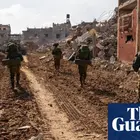On 19 June 2024, I was scheduled to give a lecture at Ben-Gurion University of the Negev (BGU) in Be’er Sheva, Israel. My lecture was part of an event about the worldwide campus protests against Israel, and I planned to address the war in Gaza and more broadly the question of whether the protests were sincere expressions of outrage or motivated by antisemitism, as some had claimed. But things did not work out as planned.
When I arrived at the entrance to the lecture hall, I saw a group of students congregating. It soon transpired that they were not there to attend the event but to protest against it. The students had been summoned, it appeared, by a WhatsApp message that went out the day before, which flagged the lecture and called for action: “We will not allow it! How long will we commit treason against ourselves?!?!?!??!!”
The message went on to allege that I had signed a petition that described Israel as a “regime of apartheid” (in fact, the petition referred to a regime of apartheid in the West Bank). I was also “accused” of having written an article for the New York Times, in November 2023, in which I stated that although the statements of Israeli leaders suggested genocidal intent, there was still time to stop Israel from perpetrating genocide. On this, I was guilty as charged. The organiser of the event, the distinguished geographer Oren Yiftachel, was similarly criticised. His offences included having served as the director of the “anti-Zionist” B’Tselem, a globally respected human rights NGO.
As the panel participants and a handful of mostly elderly faculty members filed into the hall, security guards prevented the protesting students from entering. But they did not stop them from keeping the lecture hall door open, calling out slogans on a bullhorn and banging with all their might on the walls.
After over an hour of disruption, we agreed that perhaps the best step forward would be to ask the student protesters to join us for a conversation, on the condition that they stop the disruption. A fair number of those activists eventually walked in and for the next two hours we sat down and talked. As it turned out, most of these young men and women had recently returned from reserve service, during which they had been deployed in the Gaza Strip.
This was not a friendly or “positive” exchange of views, but it was revealing. These students were not necessarily representative of the student body in Israel as a whole. They were activists in extreme rightwing organisations. But in many ways, what they were saying reflected a much more widespread sentiment in the country.
Comments
(・_・;)
There's nothing here…
 As a former IDF soldier and historian of genocide, I was deeply disturbed by my recent visit to Israel
As a former IDF soldier and historian of genocide, I was deeply disturbed by my recent visit to Israel